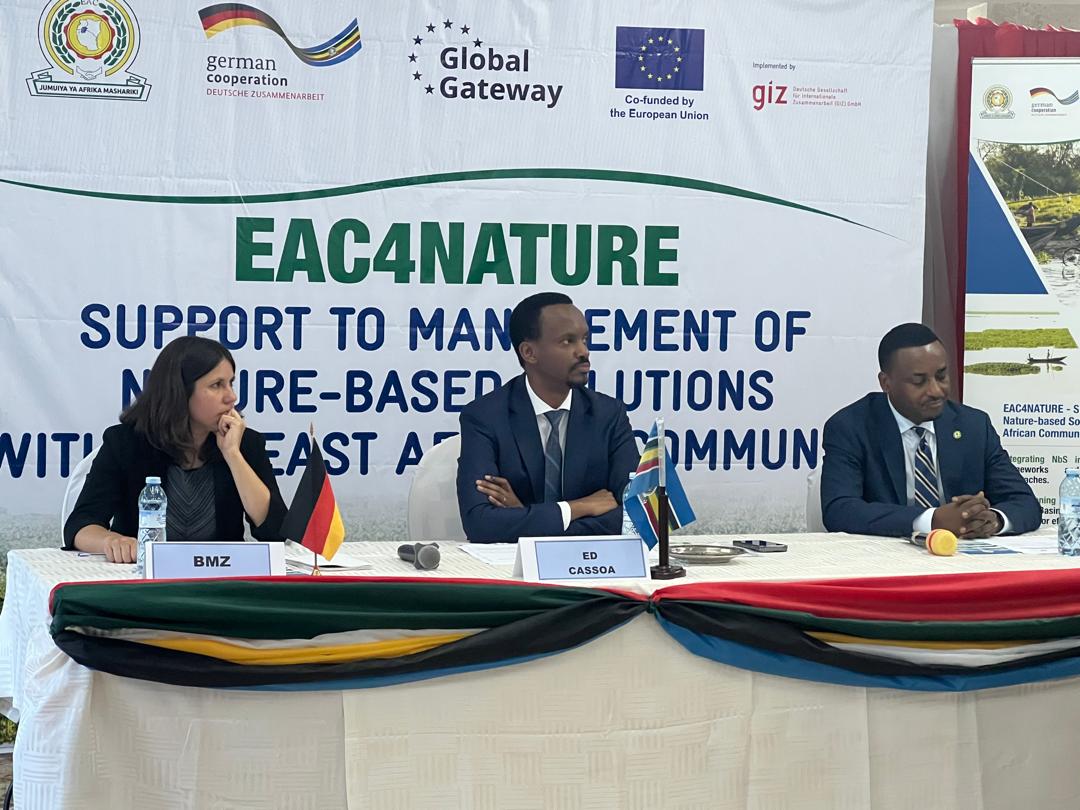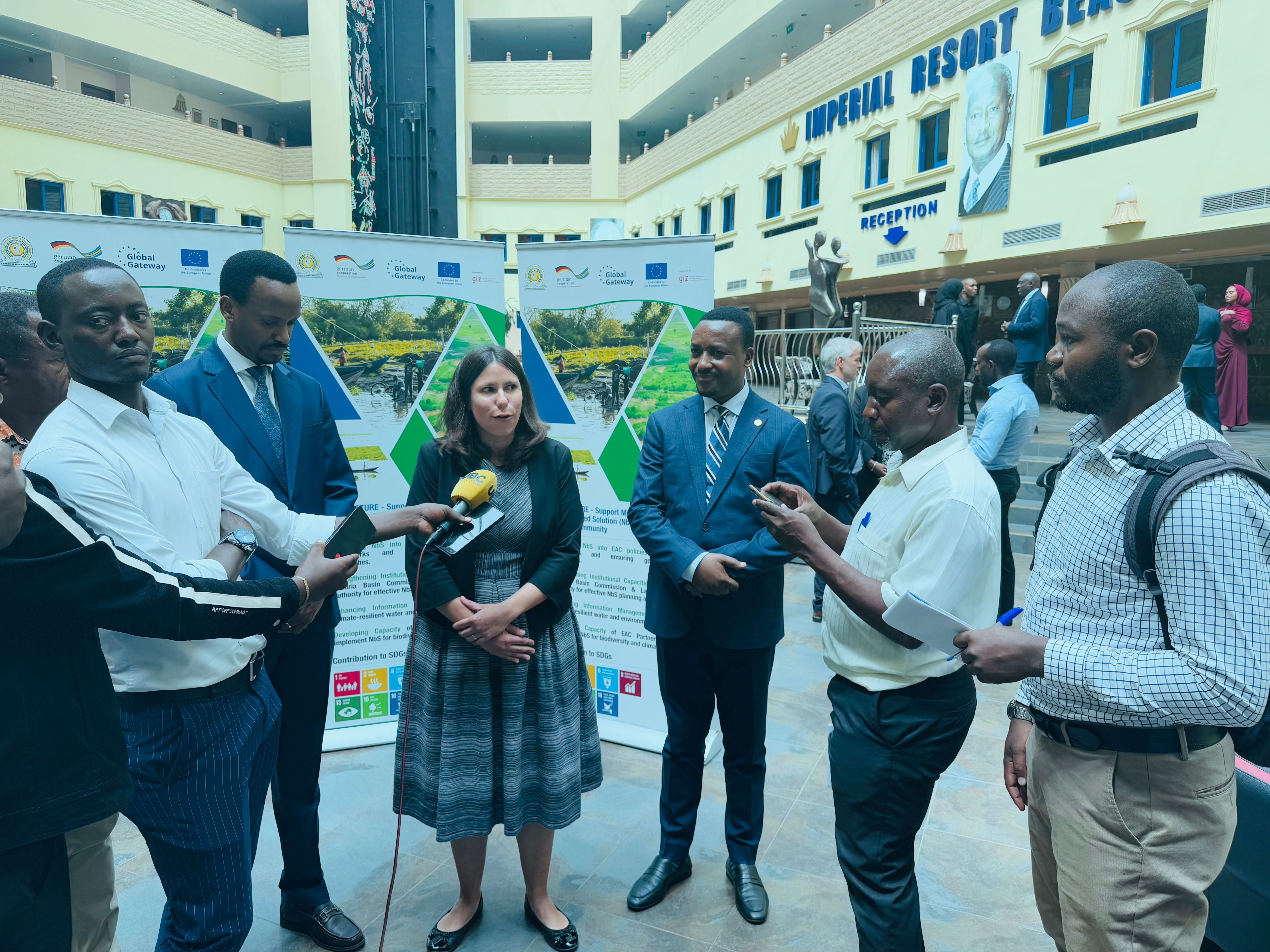On 17 March 2025, the EAC, in collaboration with the German Federal Ministry for Economic Cooperation and Development (BMZ) and the European Union (EU), launched the EAC4Nature Project, a transformative three-year initiative designed to enhance sustainable natural resource management across the region.
The project, titled in full “Support to Management of Nature-Based Solutions with the East African Community” will run from January 2025 to June 2028 with a total funding of 8 million euros (5.5 million Euros from BMZ and 2. 5 million Euros from the EU).
Co-financed by BMZ and the EU and implemented by GIZ, the EAC4Nature Project will focus on three key areas, namely: (i) Integrating Nature-based Solutions (NbS) into EAC policies and regulations while ensuring gender-sensitive approaches. (ii) Strengthening the institutional capacities of the Lake Victoria Basin Commission (LVBC), Lake Tanganyika Authority (LTA), and Lake Kivu and Rusizi River Basin Authority (ABAKIR) for effective NbS planning and coordination; and (iii) Enhancing information management to support climate-resilient water and environmental solutions.
Speaking during the official launch of the project in Entebbe, Uganda on behalf of the EAC Secretary General, H.E Veronica Nduva, the Executive Director of the Civil Aviation Safety and Security Oversight Agency (CASSOA), Eng. Richard Gatete, reaffirmed the EAC’s commitment to integrating nature-based solutions into regional climate policies and frameworks.
“As we launch the EAC4Nature Project today, let us remember that this is not just a project; it is a call to action. It is a call to work together, across borders and sectors, to protect our natural wealth, build climate resilience and secure a sustainable future for the people of East Africa,” said Eng. Gatete.
Eng. Gatete hailed the invaluable support provided by the BMZ and the EU, adding that such partnerships had been instrumental in driving transformative change across the region.
Eng. Gatete said the project will promote the use of Nature-Based Solutions to provide a transformative pathway to address climate change while enhancing biodiversity and improving livelihoods.
“Through the EAC4Nature Project, the region seeks to foster stronger partnerships between regional institutions, development partners, and communities to jointly safeguard ecosystems’’, added Eng. Gatete.
Julia Kronberg, Head of Development Cooperation at the German Embassy in Tanzania, emphasised Germany’s strong partnership with the EAC in advancing climate resilience, sustainable agriculture, public health, trade and regional integration.
“Germany has an interest to build strong international partnerships to promote nature-based solutions and even more so nature-based resilience. We are proud to collaborate with the EAC and EU in addressing a triangle of climate change, environmental pollution and biodiversity loss focusing on fresh-water nature-based solutions in and for East Africa”, said Mrs Kronberg.
Mrs Julia Kronberg was represented by Mrs Alicia Van den Boom, Head of Cooperation at the Embassy of the Federal Republic of Germany, Uganda.
On behalf of the EU, Mr Pierre-Yves Renaud, Manager for Energy, Water, Sanitation, and Environment at the EU Delegation to Burundi, reaffirmed the EU’s long-standing commitment to sustainable water management and regional cooperation in the Great Lakes Region.
“Tanganyika Kivu Water Management (TAKIWAMA) reflects the EU’s dedication to environmental sustainability, economic resilience, and transboundary water governance. We are proud to support regional institutions and partners in their efforts to protect water resources, enhance livelihoods, and advance regional integration,” said Mr Renaud.
In her remarks, Eng. Coletha Ruhamya, the Deputy Executive Director of the Lake Victoria Basin Commission (LVBC) and Mr Kwibisa Linywalii, the Director for Monitoring and Evaluation of Lake Tanganyika Authority (LTA), both underscored the importance of the project, highlighting its potential to enhance data-driven decision-making, strengthen institutional cooperation and foster innovative approaches to managing the shared water resources and ecosystems within the region.
On his part, Mr. Jean Paul Nyembo Mwamba, the Coordinating Director from Lake Kivu and Rusizi River Basin Authority (ABAKIR) said that the project was not just about conservation but also integrating nature-based solutions in the regional policies, frameworks, and practices to ensure sustainable natural resource management and climate resilience.
The EAC4Nature Project builds on the 6th EAC Development Strategy, which prioritises transboundary environmental management and climate resilience. It also aligns with the EAC Gender Mainstreaming Policy and IUCN standards for Nature-Based Solutions, ensuring that women, youth, and vulnerable communities actively participate in project implementation and decision-making.
Find more information about the EAC4Nature Project here.

